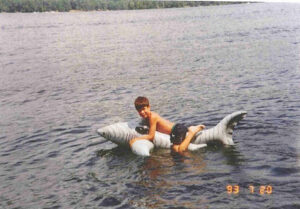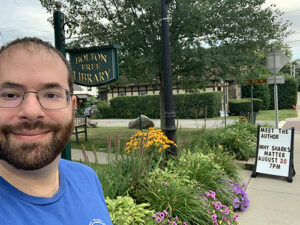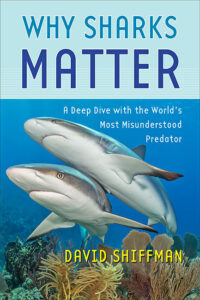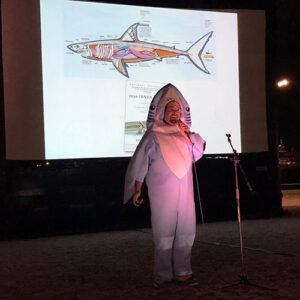By Mark Frost, Chronicle Editor
David Shiffman has a photo of himself as a boy floating on an inflatable shark.

“I feel like most little kids go through a shark or a dinosaur thing at some point,” he told The Chronicle Monday. “And I just never grew out of it.”
A marine conservation biologist, Dr. Shiffman, 38, has a new hot-selling book, Why Sharks Matter: A Deep Dive with the World’s Most Misunderstood Predator.”
“It’s the first ever comprehensive guide to the science and law behind saving threatened sharks from extinction that you don’t need to have a PhD to read,” he says. “I want people to understand that we’re better off with healthy shark populations off our coasts than we are without them, and we’re in danger of losing many species forever.”
He spoke to The Chronicle by phone Monday from a dock at Fourteen-Mile Island in the Narrows of Lake George, where he was wrapping up a two-week vacation with family culminating in a talk at Bolton Library Tuesday, Aug. 30.
“My grandparents [Harold and Lois Tucker] came to Lake George on their honeymoon and fell in love with it and bought a property on Fourteen-Mile Island,” he said.
“My mom has been up here every summer of her life, and so have I.”
Dr. Shiffman says, “Grandpa took us traveling all over the world. And grandpa loved nature and loved the natural world. He was one of the first scuba divers. He actually helped Frank Leonbruno, who used to be a ranger in our part of Lake George, set a bunch of the buoys that are there, because he had scuba gear.”
Dr. Shiffman, 38, grew up in Pittsburgh and vacationed at Lake George, not exactly salt water situations.
“I actually know a lot of marine biologists who grew up far from the ocean. There’s something about the ocean in your imagination when you don’t see it every day, I suppose. I’ve always known that I wanted to work with sharks. I’ve always known that I wanted to be a marine biologist in some capacity.”

He likes what he calls “the public science” part, too. “One of my favorite things that I do as part of my job is speaking to the public…” said Dr. Shiffman.
“My friends call me Captain Extrovert. I am very active on social media. I’m one of the most followed scientists in the world [under the name] whysharksmatter — all one word — on Twitter, Facebook and Instagram.”
And he knows how to score in the media. “I’ve been described as Shark Week’s biggest critic,” he says of the Discovering Channel annual July extravaganza. “and I don’t know if that’s true but I am certainly disappointed in what used to be a great way to learn and has become a dumpster fire of misinformation.”
Johns Hopkins University Press published Why Sharks Matter ($24.95). “They’ve already ordered a second printing. It’s sold thousands of copies,” Dr. Shiffman said.
“I got a featured review in The New York Times. That was amazing. I got to go on National Public Radio Science Friday, which had been a career goal for me….

“Academic publishing is a little bit of a different piece than something like Penguin Random House. But I wanted to go as an academic publisher, because I’m an academic. There’s sort of a more rigorous fact checking involved that I wanted.
“But the book is very accessible…I’ve been thrilled with the sales and it’s allowed me to go on this amazing trip all over the world.”
Who arranges his speaking appearances? “100% me. I just look at places that I want to go — because I know someone there sometimes, because I’ve always wanted to go there. Sometimes it’s because I’m already near there for a work trip or something like that. And I find cities and I say all right, there’s an aquarium in this city. There’s a great bookstore in this city. And I reached out.
“It’s been all me planning it….The Bolton library talk…will be my 22nd talk. There’s another 20 or so this year. And I am having so much fun with this.”
Dr. Shiffman obtained his Ph.D. from the University of Miami in Ecosystem Science and Policy, his Master of Science from College of Charleston in Marine Biology, and his Bachelor of Science from Duke University in General Biology.
It still all comes back to sharks.
“At this point in my life, I’ve seen thousands of sharks on five continents, 54 species, and I’m still as excited every time I see one as I was the first time I saw one, when I was a little kid.
“There’s just something about them. They’re powerful, they’re sleek. You just look at them and you feel a certain way. I have similar interactions when I’m at the zoo, or when I got to go on safari with my grandfather, when we saw a lion. Seeing a large wild animal is just amazing.”

“I am what’s called a marine conservation biologist, which means that I don’t just study sharks, but I study how to protect them. It means studying threats and their policy solutions as well as studying shark behavior. It’s an interesting career that has taken me all over the world. I now live and work in Washington, D.C.,” as a faculty research associate at Arizona State University, which “actually has a campus” in Washington. Dr. Shifman notes that he’s now living closer to Lake George than he’s been since college.
What does Dr. Shiffman want to see done about sharks?
“So we need a lot more science funding to help understand these animals and the role they play. The U.S. is generally doing fairly well…The big threat facing sharks is unsustainable overfishing. And there are two schools of thoughts on what the solution to that should be. Most scientists — and I surveyed most scientists — say we should make fisheries more sustainable. And most environmentalists agree with that. I surveyed most environmentalists for my research.
“There is a somewhat fringe group that has a very, very loud microphone that’s been amplified on social media that says no, there’s no such thing as a sustainable fishery….And there are all these calls that we need to ban all shark fishing everywhere. And what that’s saying is, they would like poor people in the developing world to starve to death. And that’s not a good solution.”
Dr. Shiffman notes, “My parents have retired to south Florida. And you can get two species of shark meat at the seafood counter at their Publix [supermarket]. And I know we had at least once in my childhood, when it was a Grand Union and not a TOPS in Bolton Landing, we got mako shark and grilled that out here.”
“People absolutely eat shark,” Dr. Shiffman said. “Shark fins are part of a traditional Asian delicacy called Shark Fins Soup. A lot of fringe conservation people are only aware of shark fins as a conservation problem, and not shark meats.
“And that has some racial and cultural connotations to it — that they’re not aware of all the harm being caused by white people to traditional Asian communities. And that leads to some troubles.”
Does Dr. Shiffman have any optimism about the future of sharks?
“I am optimistic that we’ll be able to avert the worst of this. I don’t know if we’ll be able to fix everything. I hope we will and I won’t stop fighting. But just looking at how hard it is to get anything done, international negotiations, even within U.S. politics, it’s hard to be completely [optimistic] about the future. But more people care than ever before and more people want to learn how to help than ever before and that’s got to be a good sign.”
Copyright © 2022 Lone Oak Publishing Co., Inc. All Rights Reserved
 Glens Falls Chronicle Serving the Glens Falls/Lake George region; Warren, Washington and northern Saratoga counties since 1980
Glens Falls Chronicle Serving the Glens Falls/Lake George region; Warren, Washington and northern Saratoga counties since 1980

